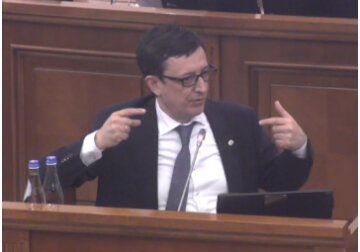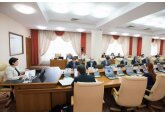
The official reserve assets of the National Bank of Moldova remain at a fairly large level and are able to cover imports within 4.8 months with a required minimum of 3 months - Octavian Armasu.
This was stated by the president of the National Bank of Moldova, speaking to the deputies of the parliament. He stressed that the reduction of the NBM's foreign currency reserves by $647.3 million in the period from the end of October 2021, when they were at a record level of $4 billion 073.42 million, to $3 billion 426.1 million as of March 30, 2022, occurred against the backdrop of two external shocks: the crisis in the energy market due to rising prices for imported gas and oil products last autumn and the military conflict in Ukraine. To combat the effects of these shocks, the NBM intervened by selling currency on the market in the necessary volumes to limit excessive exchange rate volatility, regulate imbalances in the balance of payments, meet the needs of the population in foreign currency, maintain Moldova's macro-financial stability. In the period from November 2021 to March 2022, net sales of the NBM currency amounted to $712.1 million. The head of the National Bank noted that the effects of the crisis were felt from the beginning of November, when the market could not fully satisfy the increased demand for currency from energy importers. In particular, their demand for foreign currency in November 2021-March 2022 increased to $767.2 million, which is $524.9 million (almost 3 times) higher than in the same period of the previous year. The armed conflict in Ukraine this year caused a great stir in the local foreign exchange market, which lasted 23 calendar days - from February 24 to March 18. The currency deficit in the market during this period was 6.5 times higher than the figures for the same 23 days (February 1-23) before the start of the Russian invasion of Ukraine. As Octavian Armasu emphasized, in this situation, the need for NBM interventions increased in order to calm the market and prevent strong volatility in the leu exchange rate. During the period of excitement, the NBM's foreign exchange interventions to sell foreign currency tripled compared to the beginning of the year before the conflict, and amounted to $346 million (49% of all interventions since the beginning of November). In the period from February 24 to March 18, the net demand for the currency from both economic agents and individuals grew strongly, although the latter usually sold the currency on the market. During the period of excitement, there has been a transfer of accounts of individuals from national to foreign currency. Their foreign currency and lei account balances declined, and most of the withdrawals in lei were made to buy foreign currency. The demand for foreign currency increased, there was a migration from lei to foreign currency accounts. The head of the NBM noted that the purpose of the National Bank's interventions was to ensure target inflation and maintain price stability. One effect of the intervention was to reduce inflationary pressures from external shocks and reduce excess liquidity in the banking system. Octavian Armasu noted that the official reserve assets of the National Bank remain at a fairly large level and are able to cover imports for 4.8 months with a required minimum of 3 months. The head of the National Bank stressed that, in the event of the end of the war in Ukraine, part of the NBM's foreign currency assets will be restored as a result of the dedollarization of deposits, citizens will return to the market and sell foreign currency. Octavian Armasu explained that, without intervention in the form of currency sales, there would have been a strong devaluation of the leu, which would have led to an even greater increase in fuel prices in the country, energy resources, would have led to higher inflation, an accelerated increase in prices for all products, medicines etc. Instability in the foreign exchange market would affect investment activity. The head of the NBM said that a significant devaluation of the leu would have affected imports, and the tariffs for the same gas would have increased even more. There would be higher inflation. At the same time, the NBM prevented excessive exchange rate fluctuations and prevented stronger inflationary processes. According to him, as a result of foreign exchange interventions, 8 billion lei were withdrawn from the market, which will also further help reduce the inflationary process. The reduction in foreign currency reserves also reduced the money supply. Decreased demand for currency from the financial sector. Banks had to manage liquidity and raise deposit rates. The withdrawal of money from the accounts has stopped. Octavian Armasu explained that the NBM makes savings in lei attractive. The rates on deposits are rising, and this is one of the pillars of the stability of the leu. He noted that the NBM has accumulated sufficient reserves to intervene and ensure market stability during shocks, and that is what the reserves were used for. “The goal has been achieved. The assets of the NBM remain at a sufficiently large level, which makes it possible to cope with the shocks caused by instability and the pandemic crisis,” the head of the National Bank said. According to him, when calm returns to restore reserves, the NBM will buy excess currency. In the last days of March, the NBM has already bought $11.2 million and will continue to buy. In addition, as the head of the NBM noted, the National Bank's foreign currency reserves will also increase due to external financing from various sources - from the IMF, the EU and other donors, which will contribute to the growth of the NBM's assets. // 31.03.2022 — InfoMarket







